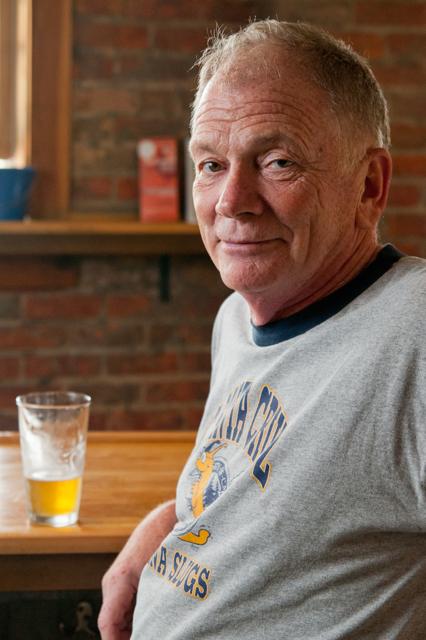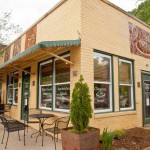- Captain of the Wedge: Tim Schaller wants to keep the Wedge Building artist-friendly, he says. Photos by Max Cooper
- Spirit of the RAD: “We think there's a lot of old soul down here,” Charles Triber says. At left is his wife and co-owner of the Junction, Tanya.
- Cornerstone: Clingman Cafe was one of the first restaurants to come about in the revival period of the RAD. The current owners, Trip and Pamela Howell, bought it from Damien Cavicchi in 2007.
The WNC area is a new craft-beer hot spot. But will the influx of new industry turn a certain area — i.e., the River Arts District — into a brewery boomtown?
New Belgium Brewery's planned move near the river in the next couple of years is a boon to the area, say most RAD-dwellers. Asheville will give New Belgium $3.5 million in tax reimbursements over seven years, as long as the brewery invests $175 million in its property. The city will also put more than half a million dollars into the infrastructure of the RAD to accommodate the resulting spike in industry and tourism.
New Belgium officials recently hosted a town hall-style forum where its reps attempted to address questions and concerns from locals, many of whom are united in the effort to ensure the area does not lose its character.
Cornerstone of community
Local artist John Payne owned the Wedge Building until he passed away in 2008. His friend, Tim Schaller, built the Wedge brewery on the lower floor because he felt at home among the artists working in the iconic building. “This is pretty good,” he says, “to make a living, have a place where they can't throw me out of the bar and be able to walk over to Clingman [Café] and eat.” On particularly nice days, the line of people waiting for pints at the brewery snakes out of the door. “If you do what you believe in, you might be surprised — other people might like it, too,” Schaller says.
Artist Josh Copus, a bartender at the Wedge, once made an art installation out of bricks stamped with the word "community." Copus invited people to take them, and Schaller placed a few near the foundation of the Wedge, incorporating one into the wall of his taproom. He’s invested in the River Arts District community, and he thinks New Belgium will be a great asset, but wonders what it means for the future of the neighborhood.
The exterior of the Wedge is part postindustrial train yard, part sculpture-studded beer garden, in view of both artist studios and abandoned buildings. “It’s not slick yet, and hopefully we can keep it that way,” Schaller says. “I don’t want to be saying five years from now, ‘Remember when it was cool here?’ That really is the fear.”
But various projects have begun to gather steam since New Belgium announced plans to break ground by the river. Plans are in the works for new restaurants. Some are rumors, such as the gossip that the so-called ice factory (abandoned and covered in epic graffiti) will be renovated into a workable building. But there's no denying that real estate prices are climbing.
The city is slated to reassess property values next year, which has owners wondering what will happen. "If assessments go up to what they could here, somebody's going to have to make up the difference in the taxes," Schaller notes. He acknowledges that it takes money to build a good city, and he praises Asheville for its interest in building greenways. But, if everyone has to pay more taxes, and rents have to be raised, could art be priced right out of the arts district?
"The question is: Can we keep this an artist district?" Schaller says. "Because, if you go to the Chamber, they tell you they send the trolleys down here because one of the things that makes [us] different than Indianapolis is having an arts district. If you lose the arts district, then you're going to lose tourism."
Insanity to brilliance in one year?
The Junction restaurant and bar has only been open for a year, but owners Tanya and Charles Triber are counted among the Depot Street pioneers, along with Randy Shull and Hedy Fischer of Pink Dog Creative, Chall Gray of The Magnetic Field and others. "While most people thought we were crazy, we were willing to invest everything we had into a restaurant, which is already fairly insane, on a street where no one came," Charles says. "Eighteen months ago, there was zero foot traffic here at night."
When rumors of New Belgium began circulating, the Tribers knew it would be transformational for the district — and also validate their gamble.
"We looked at each other and said, 'Wow, we were more right than we thought,'" Tanya says. "To see a company of their reputation and their size not only pick Asheville, but this neighborhood, and say it's a great fit with their mission gives me goosebumps."
But Tanya and Charles echo Schaller’s concerns. "I think if there's any dark cloud on the horizon, it's that the property values have already increased down here and usually what that translates into is that taxes go up, and then rent rates increase," Tanya says. "We're a small, family-owned business, and it's not in our best interest for our rates to go up in the first two years of our existence.” She adds that The Junction will be better equipped to handle the tax increase because of the likely increase in business — but independent artists may have a harder time.
The Tribers moved to Asheville from Portland, Ore., a city that handled gentrification while maintaining its identity.
"And we think there's a lot of old soul down here," Charles says. "We think the River Arts District has a chance to develop differently. We think there is a possibility that the artists can maintain the integrity of the area because they've had so much time to invest and marinate."
The artists, diversity of business in the RAD and the inherent beauty of Asheville ("even from the Target parking lot,” Tanya says) is obviously part of what makes the area so attractive to businesses like New Belgium. "To that degree, they would have really missed out if they'd have chosen Philly," Tanya laughs. "We would have been sad for a few minutes and then someone else would have taken that space. But I'm glad it's them. This would be a totally different [story] if it were Coors or Budweiser or somebody without the same company philosophy that New Belgium has. They're a great fit."
"This is an experience that's very unique to watch and be a part of," Charles adds. "The same people that were here in the first days telling us we were crazy are the same folks coming in here now and telling us we're brilliant. We went from insanity to brilliance in one year.”
No bones about it
Sabra Kelley and Thomas Montgomery opened the now-famous 12 Bones Smokehouse on Riverside Drive late in 2005, after a long spate of construction on what was then a flood-ruined cinderblock building. At the time, Kelley says, many thought they'd never make it. Now, Kelley and Montgomery are often credited with leading the charge for eateries in the area.
“We were just banking on the folks driving by, going to the dump or going to the highway," she says. “When we first moved down here, there were artists down there, but it was not a destination spot."
Kelly and Montgomery say they originally hoped to feed 125 people a day. Now, it's not unusual to see 700 customers. The record so far is nearly 900, a number the restaurant hit after Barack Obama's visit in 2010.
The couple has had time to process their popularity with the president, but Kelley says the New Belgium announcement is still surprising — especially considering the location of the river. "I know what dealing with flood-plain issues means, because we've gone through it," she says. "Bless their hearts for going there. Breweries, in general, do a good job of adaptive reuse, and I think it's a really good fit."
Distinguished neighbors aside, the area still retains its charming (and sometimes not-so-charming) grittiness. “To be honest with you, there are still hookers in our parking lot sometimes, so it's not that fancy," Kelley laughs.
Funkiness, she says, is part of the area's character. Kelley bristles when people suggest that the area needs to be “cleaned up.”
"If you clean it all up, it just looks like everything else," she says. Hopefully, she adds, something can be done to ensure artists don't get priced out of the area.
If the plight of the artists doesn't move you, consider the barbecue — and its heretofore very reasonable price. "We've been here for so long that we're kind of grandfathered in, but that could change any second," Kelley says. "You're not going to get cheap pork if the rent goes through the roof.”
Duck tales
Ben Mixson and wife Laura Reuss considered many locations for their White Duck Taco Shop. "For whatever reason, nothing really worked," says Mixson.
Then the couple met John Bryant, a local developer who saw a potential for affordable artist studios in the historic Hatchery Building on Roberts Street, and also thought an inexpensive taqueria might be a nice fit. When construction on White Duck began there in 2011, police officers were posted across the street near the recently reopened Hillcrest Pedestrian Bridge, waiting for trouble that didn't come.
It was a bold move for a young couple fresh from Utah. "We took a huge gamble. We didn't know if people would want to come down here at all," Mixson laughs.
But they surely have. Mixson estimates that the restaurant feeds 500 to 600 people a day. In a few years, New Belgium will set up shop right across the river. How that might affect his restaurant, Mixson can't say.
"It's already bringing a lot of attention down here, and as far visitors and traffic and things like that, it's going to be a big change," Mixson says. "And I know they're in the process of trying to figure out what kind of improvements they want to put in, as far as bike lanes and walking paths. From a pedestrian perspective, that's great."
The RAD has been good to the duo; they recently announced plans to add another eatery to their tiny taco empire.
Soon, it may hard to replicate the success of even relative newcomers like Mixson and Ruess. It's hard to tell when the building boom will end, but the cheap property boom may be almost over.
Mixson estimates that New Belgium may bring 100,000 visitors to the RAD per year. "That's good for the River Arts District and it's really good for the city," he says. "And I think that the majority of the credit should go to the artists that were here for 20 years before."
Grandfathered in
To the untrained eye, the potential of the nearly 2-acre 233 Riverside Drive property that Matt Logan purchased last year is hard to see — one small building on the property, for example, is rumored to have been a crack den. "There was, at least, some criminal activity there," says Logan, who also owns 5 Walnut Wine Bar downtown.
Facing the river will be a new bar and restaurant, built out of recycled shipping containers. Even with the hot midday sun beating down, a breeze blowing from the river cools a large expanse of lawn, where Logan will one day have benches and picnic tables, a greenhouse and raised organic gardens. Space has also been dedicated for a farmers market.
When Logan was considering the Riverside space, rumors were already swirling around the nearby Craven Street property where New Belgium is set to build. "I knew that they were trying to get someone there, and it was a dream come true, obviously, to have New Belgium [come] there," he says. "It's an incredible company and I think they're going to do incredible things for the river area."
Whichever way the wind blows, Logan says, change is coming — and it's partially up to the property owners to ensure stable and positive growth. “Who knows what other businesses, good or bad, may come," he says. "It's important to me to respect all of the River Arts District people who were already here. I want to keep this property pristine, beautiful and Asheville-friendly. To me, the value is in keeping it beautiful.”
“The second-busiest restaurant in the RAD”
Trip and Pamela Howell bought Clingman Cafe from Damien Cavicchi in 2007. Shortly afterward, Pamela bought Trip a bumper sticker with the Clingman logo. It read “The second-busiest restaurant in the River Arts District.” It was a joke at the time — 12 Bones was already booming and there really wasn’t any other competition to speak of. “Good thing Trip never put it on his car,” Pamela says.
Now, a half-dozen restaurants (along with a couple of dozen more galleries and businesses) make up the River Arts District Business Association. The group’s first meeting was almost exactly a year ago. The association is focused on some of the issues that may arise from New Belgium's arrival, Trip says.
According to Trip, "99.9 percent of the people that you talk to around here are really excited. In the whole scheme of things, if you had to define a corporate entity that could come here, a beer player that is environmentally conscious, promotes recycling — you look at their brewery in Colorado and [know] that it could work here. It's a nice fit."
Even so, concern for the area’s vibrant culture among gentrification remains among the RADBA members. Though property prices aren’t likely to remain bottom-dollar, control of some sort is necessary, they say. “We can’t have it skyrocket to where the only people that can afford to be here is Williams and Sonoma. We are having this discussion now," he says, "And we have a little time, as well as history from other areas. I'm not anti-development, but … the reason that people come here is because it's so unique — you can't duplicate this in any other town. They can get Charlotte in Charlotte," Trip says.
"That should be our slogan," says Pamela.
Most people in the RAD feel that New Belgium ended up on the winning end, she says. “And certainly they did their research of the area; I don't think they'd pick a place they want to change. But I love the defensiveness of this area: Everybody's welcome, just remember why this place is what it is. It’s a nourishing place for artists that's affordable. It's a community. And if you don't have that attitude, it just stands out.”






Before you comment
The comments section is here to provide a platform for civil dialogue on the issues we face together as a local community. Xpress is committed to offering this platform for all voices, but when the tone of the discussion gets nasty or strays off topic, we believe many people choose not to participate. Xpress editors are determined to moderate comments to ensure a constructive interchange is maintained. All comments judged not to be in keeping with the spirit of civil discourse will be removed and repeat violators will be banned. See here for our terms of service. Thank you for being part of this effort to promote respectful discussion.